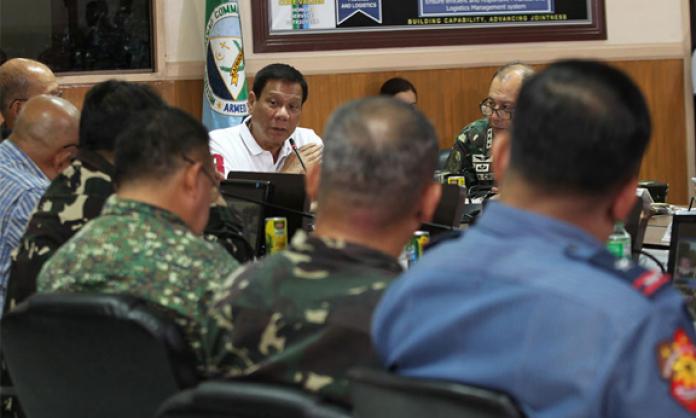Philippine president Rodrigo Duterte declared martial law across the southern island of Mindanao on 23 May in response to an outbreak of fighting between the military and the “Maute group”, in Marawi City. Thirty-one years after the so-called “people power” revolution brought an end to the dictatorship of Ferdinand Marcos, it appears that the Philippines is again headed for a political crisis.
The Maute group is purportedly aligned with ISIS and is the latest of a range of groups to have broken from the mainstream Moro Islamic Liberation Front. The MILF (and before it the Moro National Liberation Front) has been waging a decades-long insurgency for an independent country in the south.
Fighting has continued in Marawi; at last count there were almost 100 fatalities, and thousands of civilians were trying to flee the city. The declaration of martial law, however, is likely to inflame the situation further, Duterte purportedly stating, “If I think that you should die, you will die”. Now, much of the population is being subjected to roadblocks, random searches and restrictions on movement.
The latest outbreak of fighting is another reflection of the inability of successive Philippine governments to resolve the conflict in Mindanao. Duterte – himself from Mindanao – has largely continued old policies, combining largely symbolic peace gestures with frequent military action.
Duterte’s action indicates a further deterioration of the political situation. Elected in 2016, he has enacted a series of authoritarian measures aimed at combating drug trafficking. These have resulted in thousands of extrajudicial killings. He has, nevertheless, retained a strong approval rating, according to polls conducted by the country’s Social Weather Stations.
His popularity has even affected sections of the left, such as the Communist Party of the Philippines and the New People’s Army. The CPP has maintained friendly relations with Duterte, despite his history of abuses. Duterte went as far as to offer them cabinet positions and has conducted negotiations aimed at ending the NPA’s insurgency.
Now the CPP has issued a statement denouncing the Duterte regime for “imposing martial law in Mindanao and subjecting the Filipino people to military rule. By declaring martial law in Mindanao, Duterte has gone beyond the threats and theatrics of the past months”. The regime responded by suspending the current round of negotiations.
The regime’s popularity, in spite of readily apparent and widespread abuses, reflects widespread cynicism over politics in the country. Much like in the conflict in Mindanao, the return of constitutional democracy after 1986 was not accompanied by great improvements in many people’s lives. The proportion of the population living below the formal level of income poverty has not fallen since 2000.
The political process remained dominated by “trapos” (traditional politicians) drawn from wealthy and landowning families. Duterte’s “warlord” approach is a pronounced expression of how these groups often rule locally.
Opposition to martial law has been muted so far, as the Maute group has little popular support. It remains to be seen if this will change as martial law across the whole of Mindanao continues. Duterte may also try to impose military rule on a national scale, although this would require approval from the Congress.
Opposition and progressive elements are beginning to organise and prepare opposition to any attempt to extend authoritarian rule.











